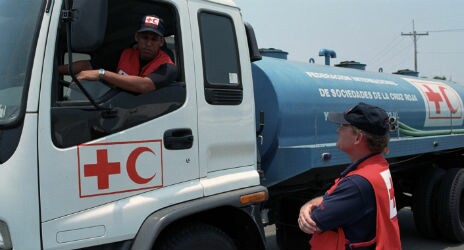
Panama strengthened its international disaster response framework by adopting two manuals on coordination of international assistance and establishing a specific visa type for humanitarian personnel.
In 2012, Panama adopted two new manuals on disaster response: the Manual of Proceedings of the Ministry of Foreign Affairs in Cases of Disasters and the Manual of the Centre of Coordination for International Humanitarian Aid and Assistance. Both manuals are based on the Regional Mechanism for Humanitarian Assistance (MecReg) developed by the Central American Integration System (SICA) to establish disaster relief mechanisms of joint, transparent and participatory action, with the collaboration of national and regional agencies.
The purpose of both manuals is to establish procedures for the coordination of international humanitarian aid and assistance, ensuring efficient use of resources and transparency. Both designate the Centre of Coordination for International Humanitarian Aid and Assistance (CCHAA), a component of the Operational Emergency Center, as the responsible entity for international humanitarian assistance management.
The Manual of Proceedings of the Ministry of Foreign Affairs in Cases of Disasters establishes procedures to be followed as an affected, assisting or transit state before, during and after a disaster. The IDRL Guidelines were used as a reference for the development of the Manual as part of the international normative framework for cooperation of humanitarian assistance.
The Manual of the Centre of Coordination for International Humanitarian Aid and Assistance puts in place modalities and procedures for the administration of international humanitarian aid. It establishes conditions and procedures for Panama to (1) receive international humanitarian aid and assistance (how to solicit it, how to receive it, how to monitor it), (2) offer its aid or assistance, and (3) facilitate the transit of aid and assistance resources on its territory. It identifies the roles and responsibilities of different actors involved in disaster response.
As recommended the IDRL Guidelines, Annex 9 of the Manual enumerates special criteria for offer and reception of medical supplies. For example, all donations should be appropriate to the needs of the country, they should be approved for use in the receiving country, they should respect quality requirements of both receiving and donating countries, medication should be at least one year from their expiry date upon arrival, and they should be appropriately labelled in a language understood in the affected receiving country.
The manuals build upon other work on international disaster response law, among which, Panama’s adoption in August 2008 of Executive Order no 320 of 2008 providing detailed regulations on national immigration policy. The Order establishes a short-stay visa category for representatives of accredited humanitarian organisations (governmental and non-governmental). As provided in the order, no fees or charges are associated with this visa type.
Both manuals as well as the creation of a visa for disaster relief personnel are good examples of progress towards a comprehensive framework for coordination of international action in the wake of a disaster.